Suspicion (1941)
Directed by: Alfred Hitchcock
Written by: Alma Reville, Francis Iles, Joan Harrison, Samson Raphaelson
Starring: Cary Grant, Cedric Hardwicke, Joan Fontaine, Nigel Bruce
USA
AVAILABLE ON DVD
RUNNING TIME: 99 min
THE HITCHCOCK CAMEO: Two cameos. 1. Walking a horse across the screen at the hunt meet. 2. Mailing a letter at a village pillar mailbox, in a long-shot, as Mrs. Newsham parks her car outside the post office to meet a friend in town.
REVIEWED BY: Dr Lenera, Official HCF Critic
Shy, dowdy Lina McLaidlaw is traveling on a train when she finds that suave, charming playboy Johnnie Aysgarth is in her first class compartment and trying to travel in it with a third class ticket. Lina pays the outstanding money for him. A few days later, she sees him at a hunt, and he begins to court her, to the disapproval of her wealthy father General McLaidlaw. They fall madly in love, but have to elope because Lina’s parents would never agree to her marrying such a cad. After a lavish honeymoon they return to an extravagant house which Johnnie surprises her with, but actually he has no job, no income, habitually lives on borrowed money, and was intending to sponge off her father. She talks him into getting a job, and he goes to work for his cousin, estate agent Captain Melbeck, but it seems that he’s not the man she thought she was….
SPOILERS [it’s hard to talk in detail about this film otherwise!].
This slow burning suspense thriller, closer to Rebecca than Foreign Correspondent, holds the attention even if it’s fairly low on thrills, and is overall an enjoyable picture, but it’s fatally flawed by one thing – the ending. Sometimes an ending can almost ‘make’ a film, and sometimes it can come close to ruining it. Incident after incident signposts the unmistakeable fact that Lina’s dashing husband is a thoroughly dishonourable man and, more than that, begins to strongly hint that he could be a murderer. Now, considering how the story builds and builds, it would have made perfect sense for him to really have been a murderer, one who not only slaughtered his best friend but is after Lina too. However, it turns out not to be the case; cowardly Johnnie actually wants to kill himself as the best way to get out of his problems. Now of course there is a case for saying that the ending is clever and surprising, and it certainly is surprising, but it just causes some of what’s come before not to make sense. Just imagine if, say, the similar Gaslight had ended in a similar manner? Suspicion is a seriously compromised movie then, and even if you ignore the ending it’s one of Hitchcock’s less interesting ’40s pictures, though the director is on far firmer ground than Mr And Mrs Smith, and it’s consistently watchable in its low key manner.
Francis Ile’s novel Before The Fact had been snapped up by RKO in 1939 and was originally intended to be a ‘’B’ movie starring George Sanders and Anne Shirley. Hitchcock got involved, the budget was raised, and Laurence Olivier and Frances Dee were to star before Cary Grant and Joan Fontaine from Rebecca became cast, Fontaine liking the part so much she wrote Hitchcock a letter offering to play it for free. The screenplay by Samuel Raphaelson, Joan Harrison and Alma Reville, which heavily altered an original one by Nathaneal West, followed the book fairly well, but because of censorship decided not to have Johnnie indulge in several affairs and even have an illegitimate son, and, more importantly, changed Johnnie from actually being a killer to it being in Lina’s mind. The book ends with the pregnant Lina killing herself and her unborn child, then Johnnie unknowingly posting a letter that incriminates him. Hitchcock often said he wished the film ended in this [far better] way, and it seems that this ending was shot, only to be rejected by preview audiences. In fact, the rest of the film was shot before they had decided how it would end. For a while it was mooted that Johnnie would redeem himself by joining the RAF and dying heroically, suicide being permissible by the censors if the person had sinned, while Lina had an affair at one point. Scenes were constantly added and subtracted elsewhere, while they didn’t even decide on a title till the very last minute. Hitchcock was decidedly unhappy and fell ill, Grant and Fontaine hated each other, and the production dragged and dragged. RKO even initially cut it down to 55 minutes to remove all bits of Grant looking menacing. Despite all this, the public flocked to it and critical opinion was good. It was the first Hitchcock film to have his name included in the title, as in ‘Alfred Hitchcock’s’ Suspicion, proof that now he was the star of his films!
The action takes place in a very quaint country England of the kind much favoured by Hollywood at the time, though this is really one of those stories that would work well in any setting, so much so that I’m surprised it hasn’t been remade as a major production. The early scenes have a light, almost screwball comedy touch to them and some contain the kind of sexual symbolism that wouldn’t trouble the censors but which Hitchcock reveled in. The couple first meet while their train is going into a tunnel, while one of Johnnie’s attempts to ‘get fresh’ is met with Lina’s snapping shut the clasp of her handbag. There’s also a really strange line when Lina asks Johnnie how many women he has kissed in a car, Johnnie replying, “You’re the first woman I’ve ever met who said yes when she meant yes”. The implication is obviously that Johnnie, who’s often photographed with glamorous looking women, has been ‘around’, though it’s a strange way of putting it and sounds decidedly dodgy. Of course the blossoming of Lina’s woman hood means that she soon stops wearing her glasses. A bespectacled female was hardly ever considered attractive in old Hollywood and actually still rarely is.
Though the pacing is fairly relaxed, we learn quite early on that the man of Lina’s dreams is actually not a very decent sort at all. He rings up debts through buying and gambling, he’s sacked from the only job he decides to go for, and most hurtfully sells two valuable chairs which were a gift from Lina’s grandfather. He makes no attempt to hide the fact that he’s a wastrel and a sponger, but it soon becomes obvious that he lies about many of the things he does. Suspicion never really catches fire, but it’s not intended to be a film of frights and big set-pieces. Instead, it’s a gradual but steady accumulation of details which eventually….well, they don’t really end up as much as you know, but I think it’s clear even early on what is being set up with a cut to Lina’s recoiling from him during a country walk, only of course he wasn’t trying to kill her but was trying to kiss her, and before the cop-out finale you really do think that Johnnie has killed his friend and intends to kill Lina. There’s the second of Hitchcock’s conversations about murder [the first being in Blackmail] that he sometimes like to include in his films, and again it’s a blackly comic scene in a film whose lighter elements, like a typically bumbling role for Nigel Bruce which not only requires him to quack like a duck at one point but annoyingly say “old bean” constantly, don’t jar with the overall seriousness of the going-ons.
The scene Suspicion is most famous for is when Johnnie goes up the stairs to the bedroom where his wife carrying a glass of milk which may contain poison, the milk glowing because of a light put inside it for emphasis. Generally this is not a showy Hitchcock film and in fact at times it shows the disinterest he ended up having with the production, though cinematographer Harry Stradling does a great job in some scenes with lots of film noir-style shadows of lines put to good use, especially when what looks like a spider’s web appears to surround Lina in her house, indicating how trapped she feels, though interestingly most of the film takes place in broad daylight. The film isn’t too convincing though in its dark love story though – for a start the two stars just don’t exhibit any chemistry – and we never really get the sense of Lina’s almost masochistic passion for Johnnie, even if composer Franz Waxman does all he can to convey said passion with his romantic swells. Later on Hitchcock would present several twisted romances for the audience very well, but he doesn’t quite succeed here. Suspicion is fairly compelling and certainly intriguing, but it never quite gets as good as you want it to.
Fontaine won Best Actress for Suspicion, though some claimed it was because she should have won for Rebecca. Her role isn’t that different, though her conveying of her character’s vulnerability and confusion is less convincing for some reason. Meanwhile Grant’s idea of giving some darker shades to his usual carefree persona is to speak some of his dialogue with no emotion. He’s okay, but seems unsure of himself, probably because while he was making the film he didn’t know if his character was a killer or not. Leo G. Carroll makes the first of seven appearances for Hitchcock, though it’s his smallest, as a cousin of Johnnie’s, and The Lady Vanishes’ Dame May Whitty is fun as an Agatha Christie-type crime novelist. Composer Franz Waxman does a fine job with the score, with an interesting use of its main theme in that it’s very fragmented and never properly developed, and some very exciting music in the climax, though the most recurring piece in the film is Johann Strauss’s waltz Wiener Blut, heard in several different guises from sinister minor key to being whistled. Suspicion remains minor Hitchcock, with a sense of coasting about the whole affair despite its tortuous production, though if they magically locate the original ending it really would be improved a great deal, and it’s still pretty reasonably enjoyable. It was remade for TV in 1987 as well as adapted for radio in 1944 and 1946.
Rating: 










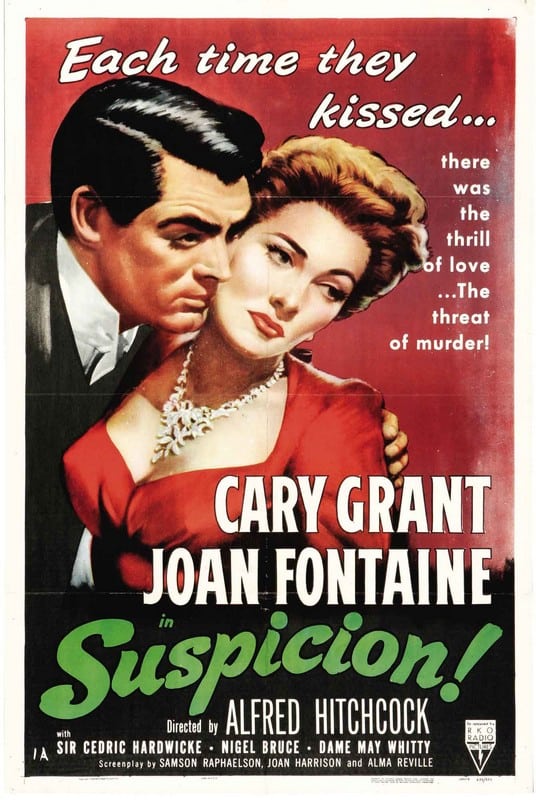
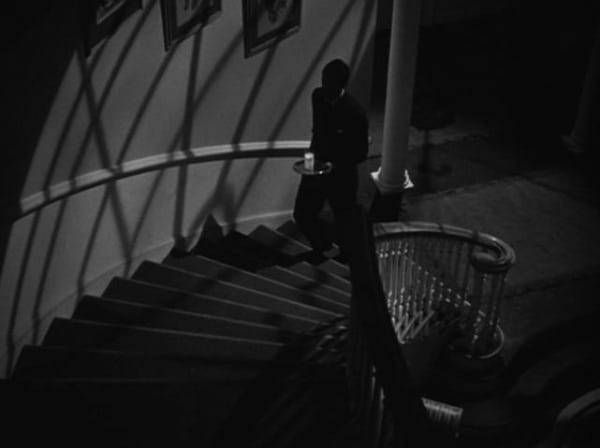
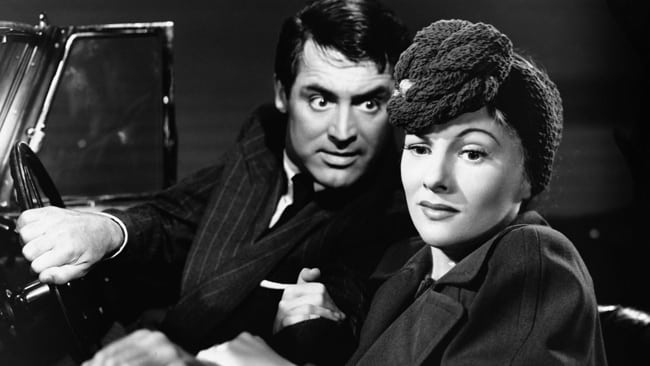

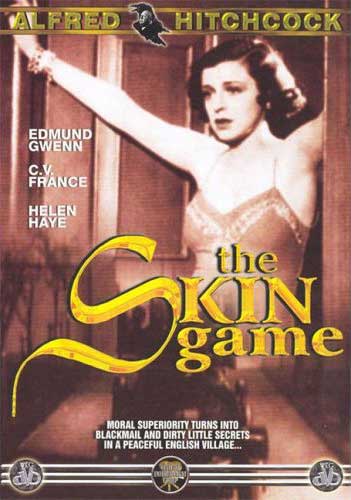
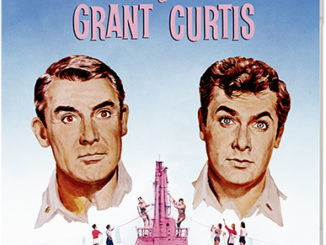
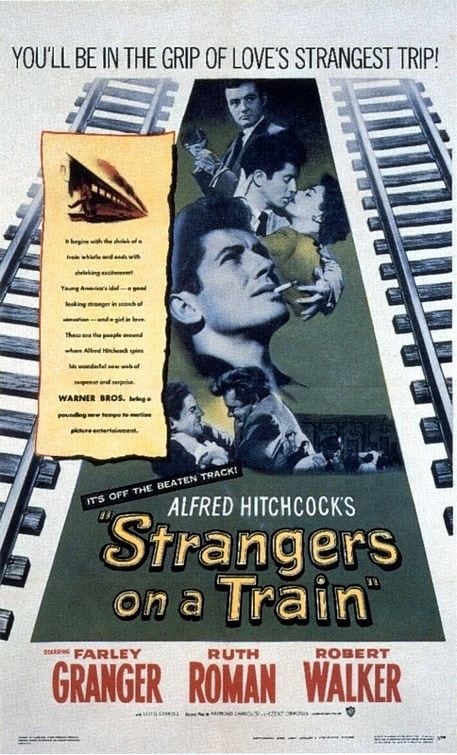
Be the first to comment